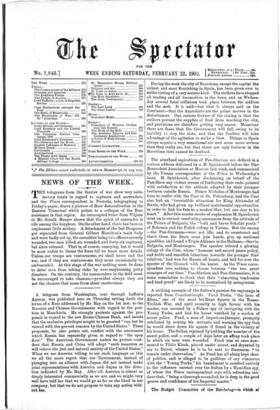The aimsjand aspirations of Pan-Slavism are defined in a curious
address delivered by a M. Spiridovich before the Slav Benevolent Association at Moscow last week, and summarised by the Vienna correspondent of the Times in Wednesday's issue. M. Spiridovich, after disclaiming on behalf of the Pan-Slays any violent means of furthering their ends, pointed with satisfaction to the attitude adopted by their younger brethren outside Russia. Prince Nicholas of Montenegro had been to confer with the Czar at St. Petersburg; and the Czar also had an "irresistible attraction for King Alexander of Servia, who had given up brilliant matrimonial opportunities in order to link his fate to a modest Slav, bet one dear to his heart." After this master stroke of euphemism M. Spiridovich went on to extract comforting assurances from the attitude of the Prince of Bulgaria, the "bold and brave Sokolist youth" of Bohemia and the Polish colony in Vienna. But the enemy —the Pan-Germans—were not idle, and to counteract and check them the Slays must join hands, give up sectional squabbles, and found a Triple Alliance in the Balkans,—Servia, Bulgaria, and Montenegro. The speaker uttered a glowing eulogy of the Czar, whose "humane and sacred peace policy, and noble and unselfish behaviour towards the younger Slav relatives," bad won for Russia all hearts, and laid for ever the spectre of the Cossack with his knout. As the Times corre- spondent sees nothing to choose between "the two great scourges of our time," Pan-Slavism and Pan-Germanism, it is some consolation to think that their "absorbing tendencies and land greed" are likely to be neutralised by antagonism.










































